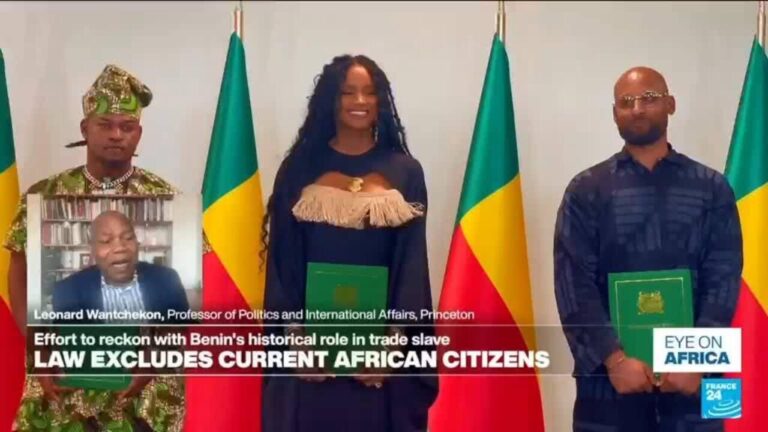Benin’s Historic Citizenship Offer to Descendants of Enslaved Africans: A New Chapter in Reparative Justice
Benin’s Pioneering Citizenship Program for African Diaspora Descendants
In a landmark development, the Republic of Benin has launched an unprecedented policy granting citizenship to individuals worldwide who can trace their ancestry to enslaved Africans. This initiative not only honors the enduring connections of the African diaspora but also acts as a meaningful step toward healing historical wounds through legal recognition and cultural restoration.Among the first to embrace this opportunity is renowned U.S.singer Ciara,exemplifying a growing movement of African descendants seeking to reclaim their heritage through formal ties to their ancestral homeland.
The citizenship request process has been designed to be accessible and respectful, requiring applicants to provide evidence of lineage or cultural affiliation via genealogical documentation or endorsements from recognized community groups.This pathway offers a range of benefits,including:
- Access to Benin’s education and healthcare systems
- Rights to property ownership and entrepreneurship within Benin’s borders
- Opportunities to engage in cultural festivals and heritage preservation activities
- Support for dual citizenship arrangements to maintain global ties
| Eligibility Requirements | Necessary Documentation |
|---|---|
| Verified descent from enslaved African ancestors | Genealogical records or community certification letters |
| Optional proof of residency history | Passport or national identification card |
| Demonstrated cultural involvement | Recommendations from Beninese cultural organizations |
Ciara and Other Trailblazers: Honoring Diaspora Connections Through Citizenship
Benin’s decision to confer honorary citizenship to descendants of enslaved Africans worldwide marks a profound acknowledgment of the transatlantic slave trade’s lasting impact. Among the first to receive this honor is celebrated American singer Ciara, whose acceptance symbolizes a renewed bond with ancestral heritage and cultural identity. This initiative not only pays tribute to the resilience of displaced communities but also fosters global solidarity through shared history.
Recipients of honorary citizenship are encouraged to actively participate in cultural and social initiatives that strengthen ties between Benin and the diaspora. Key areas of involvement include:
- Engagement in cultural exchange programs and community development projects within Benin
- Support for educational efforts that illuminate the histories and contributions of African diasporic peoples
- Promotion of heritage tourism to preserve historic sites linked to the transatlantic slave trade and stimulate local economies
| Honorary Citizen | Profession | Connection to Benin |
|---|---|---|
| Ciara | Music Artist | Advocate for cultural heritage preservation |
| Michael Thompson | Documentary Filmmaker | Chronicler of African diaspora narratives |
| Dr. Amina Diallo | Historian | Researcher on Benin’s historical role in the slave trade |
Understanding the Historical Significance of Benin’s Citizenship Initiative
Benin’s bold move to offer citizenship to descendants of enslaved Africans carries deep historical weight. Once a central node in the transatlantic slave trade,the nation is now actively confronting its past by legally recognizing those whose ancestors were forcibly removed during this tragic era. This policy not only addresses historical injustices but also empowers diaspora communities worldwide to reclaim their cultural identities and reconnect with their ancestral homeland.
The program has ignited global discussions on themes of identity, heritage, and reparative justice. Beyond its symbolic importance, the initiative provides tangible advantages such as:
- Legal documentation facilitating travel and residency within Benin and the wider West African region
- Access to cultural programs designed to revive and celebrate Beninese traditions among diaspora members
- Economic prospects through civic participation and potential investment opportunities
| Dimension | Impact |
|---|---|
| Cultural Reconnection | Revitalizing ancestral bonds and traditions |
| Legal Recognition | Granting formal citizenship rights to descendants |
| Economic Development | Encouraging investment and community growth |
| Global Awareness | Promoting accountability and historical education |
Application Process and Broader Implications for the African Diaspora
Individuals seeking to reclaim their heritage through Benin’s citizenship program can initiate their applications at Benin’s consulates worldwide or at designated government offices within the country. Applicants must provide verifiable proof of descent from enslaved Africans, a process increasingly supported by genealogical research services and biometric verification technologies. Successful applicants gain full citizenship rights, including passports, voting privileges, and access to social services, underscoring Benin’s dedication to restorative justice and inclusivity.
For the global African diaspora, this initiative transcends legal status‚ÄĒit embodies a profound cultural and emotional reconnection. Key outcomes anticipated include:
- Reinforcement of cultural identity and pride among diaspora communities
- Expanded opportunities for education, investment, and residence in Benin
- Growth in heritage tourism and strengthened international relations fostering economic development
- Setting a precedent for other nations to explore reparative citizenship programs
| Application Requirement | Details |
|---|---|
| Proof of Ancestry | Genealogical documentation or verified oral histories |
| Biometric Identification | Fingerprinting and photographic ID |
| Application Venues | Benin consulates and official government offices |
| Citizenship Privileges | Passport issuance, voting rights, access to social services |
Looking Ahead: The Future of Reparative Citizenship and Diaspora Engagement
Benin’s innovative citizenship program for descendants of enslaved Africans represents a transformative moment in the global discourse on history, identity, and reparative justice. With influential figures like U.S. singer Ciara among the first beneficiaries, this initiative not only offers a symbolic restoration of ancestral ties but also opens doors for meaningful cultural and economic collaboration. As more descendants embrace this opportunity, Benin’s example may inspire other countries to reevaluate their approaches to acknowledging and addressing the enduring legacies of the transatlantic slave trade.




